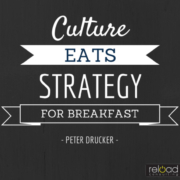The Paradox of Innovation and Evidence-based Practice: When Reliability becomes a Real Liability!
Just the facts please!
Do you work in a high-reliability industry? Is your work – your success – based on facts, figures, and data? If so, you’re probably a big fan of evidence-based practice. I work with a great deal of healthcare professionals, engineers, scientists, financial folks, and technologists. Evidence-based practice, research, and evaluation are at the heart of their work, and for good reason. Rigor and reliability are needed to both guide and to evaluate the effectiveness of their technical, medical, and scientific methods and solutions.
Might you be drawn toward novelty, creativity, and invention? Do you or your organization thrive in the unknown? If so, you might call yourself an innovation junkie for whom the notion of evidence-based practice can feel constraining.
Regardless of the type of organization or industry you live and work in, a common strategic priority is to answer the following: “How can our team, business unit, company become more innovative, come up with more innovative products/solutions, or create a culture where creativity and innovation thrive?” This is no small task for any organization, much less a highly technical one.
Enter the paradox
Not long ago I was approached by a company eager to create an internal “innovation hub,” and admittedly weary to enter into the unknown. Below is an excerpt of his email:
I find it somewhat frustrating that these pieces are not backed up with externally validated evidence – careful evaluations by disinterested third parties, comparative studies with careful case-control conditions, use of plausible counterfactuals against which to assess the impact of particular actions, etc. This frustration may of course simply reflect that these evidence issues are among my key preoccupations in the substantive work in relation to my programmes.”
There is no doubt that evidence, research, and evaluations are highly valued commodities in many work environments – where experimentation and exploration happen only if you can prove it’s worked before.
When reliability becomes a real liability
Relying too heavily upon evidence-based practices (looking backward) can inhibit innovation (looking forward), stifling opportunity. Consider, for example, programs like Six Sigma, which may increase operational efficiency and reduce waste, yet might dismiss any chance of breakthrough discovery or invention – essentially choosing tweaks over transformation.
When talking with clients about innovation, I often get requests for case studies, research, articles, or evidence where “this sort of innovation has worked before”. These requests always make me smile! By its very nature, innovation means implies something novel or new, which makes it unlikely that evidence or hard research exists to support it. Anecdotal stories and testimonies highlighted in client case studies and business magazines might make one feel more calculated, confident, even daring, yet rarely carry a risk-free promise or guarantee.
If you want disruptive innovation, Whitney Johnson (@JohnsonWhitney), says, “Throw out the performance metrics you’ve always relied on”. She contends that new metrics are needed to measure value and success. AND, your odds of success will improve when you pursue a disruptive course.
Don’t get me wrong; I’m actually a fan of proven practices, evidence, scientific research, and evaluation. If I’m at the hospital and about to go under the knife, there’s something to be said for evidence-based practice in choosing the right doctor. And thank goodness for that doctor and/or that lab scientist who was willing to seek a new, unproven method, a better way!
Innovation implies risk and no guaranteed return on investment. If your organization wants innovation, evidence and proof can become a real liability, restricting learning and trail blazing altogether. As my good friend, Saul Kaplan (@Skap5) of the Business Innovation Factory says, “Tweaks won’t do it. We need to get things off of the whiteboard and into the real world!”









Leave a Reply
Want to join the discussion?Feel free to contribute!